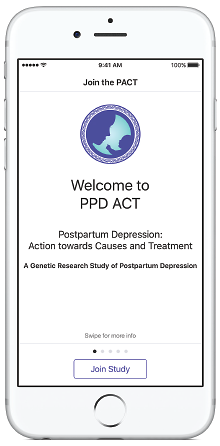Researchers Turn to Smartphone Apps to Learn About Postpartum Depression
Abstract
Mobile applications designed as research tools have the potential to leverage tremendous amounts of data to improve the diagnosis and treatment of a still-underappreciated disorder in women.
For many women, the time during pregnancy and first year after childbirth marks a period of extensive contact with health care providers—as they regularly track pregnancy and infant milestones. Despite this regular contact with health care providers, mothers’ mental health is still often overlooked.

Samantha Meltzer-Brody, M.D., M.P.H., said that using her PPD ACT mobile application as a recruiting tool enabled her to acquire 3,500 DNA samples in just over one year with minimal effort, while also providing important information to the over 60,000 women who downloaded the app.
As a research psychiatrist specializing in women’s mental health, Samantha Meltzer-Brody, M.D., M.P.H., wondered if there might be a way to leverage already popular pregnancy apps to enable women to better track their emotional well-being and perhaps encourage discussions regarding mental health concerns with their doctors.
Meltzer-Brody, director of the Perinatal Psychiatry Program at the University of North Carolina (UNC) Center for Women’s Mood Disorders, turned her idea into a large-scale consortium called PPD ACT (Postpartum Depression: Action Towards Causes and Treatment).
The centerpiece of PPD ACT is a free smartphone app that women experiencing symptoms of depression can use to gauge whether they may have postpartum depression. Those who score high are provided with resources to learn more about PPD and help them connect with health care providers.
“By using an app, women can do an initial screen in the privacy of their own homes, and they can feel confident in the results since they know this app was developed by a global research team using validated screening tools,” Meltzer-Brody told Psychiatric News.
In addition to connecting women with care, she noted that her group hopes to analyze genetic information provided by some women using the app to better understand PPD.
Women who screen as potentially having PPD are asked if they are willing to consent to provide DNA samples. Women who agree are sent a DNA swab kit free of charge. Investigators also follow up by email a few weeks later to ascertain if the woman received an official PPD diagnosis from a physician.
According to Meltzer-Brody, some 60,000 people from around the world have downloaded the app since it was released in early 2016, and of those, around 3,500 have provided DNA samples. “To get that amount of DNA in just over one year, with a broad geographic distribution, is almost unheard of,” she said.
Meltzer-Brody and her colleagues are beginning to analyze the DNA samples for clues that can identify women at risk for PPD and potential treatment options. This abundance of genetic data may also help answer the intriguing question of whether PPD is a distinct disorder as opposed to a type of major depression.
Apps May Change Screening
Leveraging mobile technology to better understand PPD is also a goal of researchers at the Ammon-Pinizzotto Center for Women’s Mental Health at Massachusetts General Hospital (MGH).

In addition to serving as a screening instrument for postpartum depression, the PPD ACT app asks users if they would like to submit DNA samples for a genetic study to better understand the causes and risk factors for PPD.
There, Pinizzotto Center Director Lee Cohen, M.D., a professor of psychiatry at Harvard Medical School, and colleagues are looking for ways smartphone apps may optimize the PPD screening process.
The current standard for PPD screening is the Edinburgh Postnatal Depression Scale (EPDS), a 10-question scale developed in 1987 by John Cox, M.D. “While Dr. Cox deserves vast praise for putting the EPDS together, there are clear problems with the practical administration of this tool,” Cohen said.
One of these problems is that while the EPDS is quick and relatively straightforward, it is a paper-and-pencil test that requires a doctor to manually score the results. Also, studies have shown that the test has around a 25 percent false positive rate, which is too high when screening large populations.
Using the EPDS as the foundation for a new app-based questionnaire, Cohen and colleagues added additional targeted, multiple-choice questions for other symptoms commonly reported by pregnant or postpartum women with depression, including sleep disturbances, anxiety, and perceived stress.
As with PPD ACT, this free app—known as the MGH Perinatal Depression Scale (MGHPDS)—generates a risk score in response to how the user answers questions about symptoms. The MGHPDS also includes educational resources and links to resources for women who screen positive for PPD.
Women who complete their questionnaire can also share their results with MGH, thus creating an ever-growing repository of survey data. Mindful of privacy issues, Cohen said that data gathering is not automatic; all participants need to opt in to contribute data, as well as consent to allow MGH staff to reach out for follow-up questions.
Cohen hopes the information shared by women using the app will help to identify which symptoms or questions are the most predictive of depression. This would enable his team to create a more optimal screening tool that would be both shorter and more accurate—a MGHPDS version 2.0, if you will.
Of course, Cohen already has visions of version 3.0 of the app and beyond. “I think it could have potential not only to screen for current depression, but also to prevent future depression,” he said. “The app could identify symptoms in pregnant women that are risk factors for postpartum depression once the baby is born.”
Future iterations could also incorporate other features like built-in treatment aids, including online behavioral therapies or a way for women to reach out and directly communicate with health professionals. The idea, said Cohen, is that through continued use and feedback, the app could eventually evolve into a one-stop shop to help women manage their depression. ■



